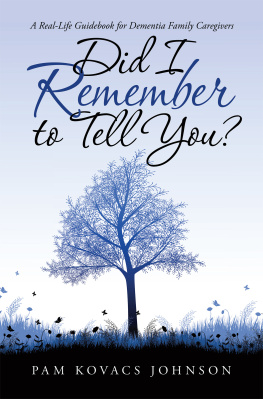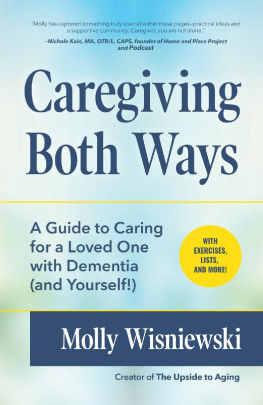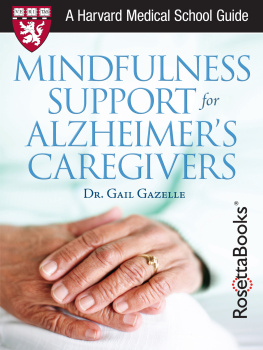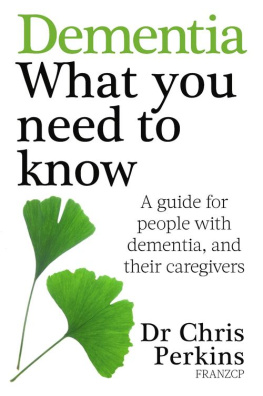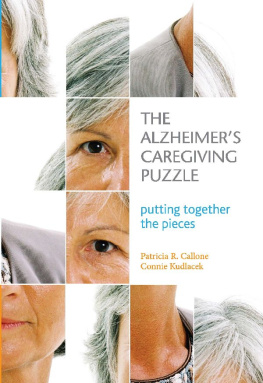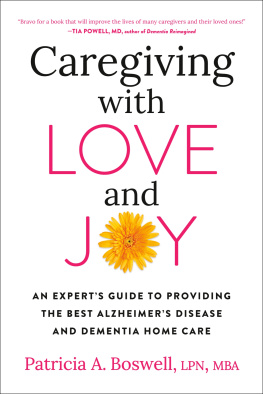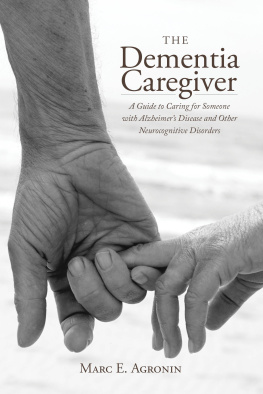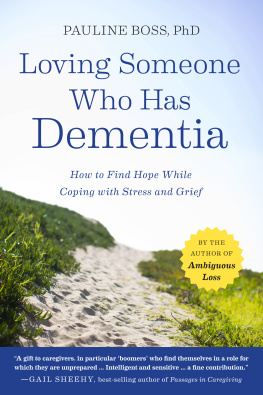When Your Loved One Has Dementia
When Your Loved One Has Dementia
A Simple Guide for Caregivers
Joy A. Glenner, Jean M. Stehman,
Judith Davagnino, Margaret J. Galante,
and Martha L. Green
The George G. Glenner Alzheimers Family Centers, Inc.
San Diego, California

2005 The Johns Hopkins University Press
All rights reserved. Published 2005
Printed in the United States of America on acid-free paper
9 8 7 6 5 4 3 2 1
The Johns Hopkins University Press
2715 North Charles Street
Baltimore, Maryland 21218-4363
www.press.jhu.edu
Library of Congress Cataloging-in-Publication Data
When your loved one has dementia : a simple guide for caregivers / Joy A.
Glenner [et al.].
p. cm.
Includes index.
ISBN 0-8018-8113-7 (hardcover : alk. paper) ISBN 0-8018-8114-5
(pbk. : alk. paper)
1. Senile dementiaPatientsHome care. 2. Senile dementia
PatientsFamily relationships. 3. Caregivers. I. Glenner, Joy A., 1930
RC523.W466 2005
362.198976831dc22
2004024466
A catalog record for this book is available from the British Library.
Contents
Introduction
The six chapters of When Your Loved One Has Dementia emphasize the importance of good communication with your family member as a method of ensuring a better quality of life for both you and your partner. A glossary is included to assist you in understanding unfamiliar words. The handbook is written in a conversational style that, we hope, will reassure and support you as you grow in your caregiving role. You can grow in this process if you try to look at it as a partnership with your ill family member and with othersfriends, family members, and care professionalswho will help you in supporting roles.
When Your Loved One Has Dementia emphasizes ongoing communication with your ill family member. We often refer to your family member as your partner. Throughout the course of a progressive dementing illness, regular and natural two-way verbal and nonverbal communication will help you determine care needs and may help you remain close to each otheras true partners. Remaining close to your partner and maintaining ties with family and friends can be an effective support system. If you are not close or have grown apart over the years, time as a caregiver for your partner can be a good opportunity to mend fences.
In this book we also use the term patient. As the disease progresses, initiation of communication, needs assessment, and the implementation of care will become more and more your responsibility. Your partner will communicate with you through actions more than words, yet you will still need to be able to understand what he or she may be trying to convey. Knowing your partner well will help with ongoing assessment as the disease becomes more severe and conversation becomes more and more nonverbal. Words that may be unfamiliar are in italics and are found in the glossary.
The better you understand the needs and feelings your family member expresses verbally and nonverbally, the easier the caregiving process will be and the more confident you will feel about your role as caregiver.
When Your Loved One Has Dementia
1 Understanding and Acceptance
Goal: This chapter will help you identify the symptoms of a dementing illness. It will also help you understand the pathology of Alzheimer disease (AD) and the latest research on it. It will suggest ways in which you and your partner can become or remain close while adjusting to the changes that lie ahead.
Early Warning Signs
We all forget things once in a while, more often as we get older. Mild forgetfulness is normal. But where does normal end and a problem begin? It is often very difficult to tell.
Benign forgetfulness is just what it implies: it is benign, or not harmful, and it is a normal part of aging.
Mild cognitive impairment (MCI) means there is some decline in memory, but the person can still cope fairly well in everyday life. It is not normal aging. Many of those diagnosed with MCI decline and develop Alzheimer disease, but many do not become noticeably worse.
Dementia is a general term meaning a global loss of intellectual functioning and normal alertness caused by disease or injury to the brain. AD is the most common cause of dementia.
lists some examples of early warning signs.
Box 1-1. Early Warning Signs
The descriptions of Mr. Carpenters problems are examples of benign forgetfulness, mild cognitive impairment, and mild dementia.
Benign forgetfulness
Mr. Carpenter is eighty years old and in good health. He has begun to be concerned, however, that he is becoming forgetful.
He keeps notes to himself folded in his wallet. On them he writes phone numbers he uses frequently and things he wishes to do that day. He refers to the notes frequently so he will remember tasks when he reads them. He then crosses off each one as he completes it.
He frequently repeats stories he has already told but usually catches himself and apologizes.
Mr. Carpenter does not have an abnormal memory problem. He makes adaptations to help him remember when he temporarily forgets. He still functions very well without help.
Mild cognitive impairment (MCI)
Mr. Carpenter gradually forgets to read the notes in his wallet, though he continues to plan and to write them. He repeats stories without realizing he is repeating.
He then makes a medical appointment for a cognitive assessment because of his new concerns.
After the evaluation of his problems confirms MCI, Mr. Carpenter decides to move to a retirement community that provides meals and van service. His losses are now noticeable, but he is still able to assess them, and he adapts well by making appropriate lifestyle changes.
Mild dementia
Mr. Carpenter has trouble driving. He gets lost frequently and avoids freeways because he cannot drive well enough anymore. When he almost hits someone with his car, he stops driving.
He starts forgetting ingredients when he cooks, and he burns things on the stove.
Mr. Carpenter may have dementia if his symptoms progress. If he becomes unable to plan ahead, regularly forgets to do routine daily activities, and forgets recent events and is unable to recall them if reminded, he may have a problem. He will probably be unable to live independently. He may decide to move to an assisted living community.
Understanding the Symptoms You May See
Try to assess your partners symptoms objectively. This can be difficult. It is natural to want to deny or fight these changes, to protect someone you love. But denial or trying to correct behaviors improperly can damage your relationship and make life more stressful for both of you.
Your objective assessment will help you and your physician obtain an accurate diagnosis and will guide you in daily life with your partner. To make an objective assessment, you must first understand and be able to identify the basic symptoms of a dementing illness. They are the symptoms observable in everyone who has a dementing illness.
The basic symptoms of dementia result from damage to all of the mental functions that we use in daily life. Remember, dementia is global brain damage. The symptoms are, of course, mild at first, but they become very severe if the dementia is progressive (such as with AD). They are not behavior problems. The brain damage causes these basic symptoms, and they result in difficult behavior.
Next page

